|
|
|
Sort Order |
|
|
|
Items / Page
|
|
|
|
|
|
|
| Srl | Item |
| 1 |
ID:
141211
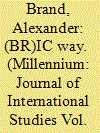

|
|
|
|
|
| Summary/Abstract |
This review article assesses two books against the background of the question of whether China and India as emerging economies provide a development ‘alternative’. The double meaning of this refers to, first, their own experience of recent rapid growth and the chances of replicating this development elsewhere. Second, it points to the external development assistance policies of the BRICs towards the global South and their impact on development thinking and practice.
|
|
|
|
|
|
|
|
|
|
|
|
|
|
|
|
| 2 |
ID:
141212
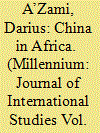

|
|
|
|
|
| Summary/Abstract |
The literature on China–Africa relations is a rapidly developing field. However, whilst it is a much richer body of work now than it was a few years ago, it has been somewhat resistant to compelling theorisation. This claim is demonstrated via discussion of three recent contributions to this literature. The discussion develops a claim that a helpful problématique might be found by framing China–Africa relations as relations between ‘unequal equals’, a particular benefit of which is that it emphasises that China–Africa relations are, inter alia specifically international relations. Whilst rigorous theoretical work has already been done, the emphasis has been societal. In this sense, the unequal equals formulation amounts to a call for greater dialogue between social and internationally oriented disciplines to resolve the under-theorisation that afflicts the study of China–Africa relations.
|
|
|
|
|
|
|
|
|
|
|
|
|
|
|
|
| 3 |
ID:
141197
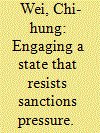

|
|
|
|
|
| Summary/Abstract |
Why did President Bill Clinton, while having linked human rights to China’s most-favoured-nation (MFN) status in 1993, delink the two issues in 1994, despite the fact that China had not improved its human rights record? This article explains Clinton’s linkage-delinkage policy reversal in terms of ‘strategic co-constitution’. After Tiananmen, Washington was concerned about China’s human rights abuses, arms proliferation and unfair trade practices. During 1992−3, Clinton initiated a ‘strategic social construction’ process that translated human rights into the linkage policy. Clinton stressed that a humane, democratic China would neither proliferate weapons nor engage in unfair trade practices. In 1994, however, a pro-MFN coalition persuaded Clinton that open trade could better advance US security, economic and human rights interests in China. Framing their rhetoric in ways that resonated with the exiting US concerns over China, pro-MFN actors led a strategic social construction process that redefined Clinton’s China policy toward engagement.
|
|
|
|
|
|
|
|
|
|
|
|
|
|
|
|
| 4 |
ID:
141204
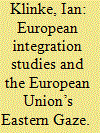

|
|
|
|
|
| Summary/Abstract |
European integration studies has recently seen the first signs of a belated critical turn. While new approaches have started to challenge the way the European Union is conventionally studied, they are yet to investigate in detail the relationship between the academic field and its primary object of study. This article draws on work in critical geopolitics to explore one of the interfaces of academic knowledge on European integration and the world of policy: the Jean Monnet Programme. In highlighting the scheme’s role in the EU’s Eastern geopolitics, it argues that European integration studies resembles other forms of area studies, such as cold war era Sovietology. This comparison elucidates both the field’s long-standing resilience to critical theory and its inability to anticipate the recent crisis of the European project.
|
|
|
|
|
|
|
|
|
|
|
|
|
|
|
|
| 5 |
ID:
141202
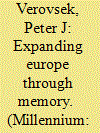

|
|
|
|
|
| Summary/Abstract |
Collective memories of war and suffering have been crucial to the development of European integration since 1945. My basic thesis is that remembrance has also played an important role in the accession of new states to the organization that has come to be known as the European Union (EU). As the EU has expanded into new regions of Europe, particularly the post-dictatorial south and the post-communist east, continental institutions and existing member-states have been confronted by conflicting understandings of the past. Although the past has continued to push states towards membership in the EU, the nature of these remembered experiences has changed through the various rounds of expansion. In addition to tracing the role that memory has played in the widening of Europe, I argue that these confrontations have sparked important debates about the meaning of the past for Europe today.
|
|
|
|
|
|
|
|
|
|
|
|
|
|
|
|
| 6 |
ID:
141209
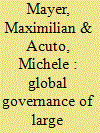

|
|
|
|
|
| Summary/Abstract |
The importance of technology in global affairs is visible to the naked and uninitiated eye. Yet International Relations (IR) still lacks a more systematic and critical attention to the role of technological infrastructures in contemporary global governance dynamics. Here, we seek to prompt IR scholars to move ‘large technical systems’ (LTSs) from the contours of IR narratives to a centre stage, as they hold the potential to respond to pressing challenges for IR scholarship. Employing LTSs to respond to recent publications on the challenge that ‘global governance’ poses to IR, we highlight that an STS-IR encounter can, first, revitalise ‘grand questions’ at the heart of IR and, second, help coping with the complexity of global governance. While this encounter does not offer a ready-tailored panacea for the troubles of IR, a more systematic inquiry into LTSs is a powerful step beyond theoretical and methodological impasses, towards greater inter-disciplinary collaboration.
|
|
|
|
|
|
|
|
|
|
|
|
|
|
|
|
| 7 |
ID:
141199
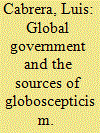

|
|
|
|
|
| Summary/Abstract |
While a number of prominent researchers have recently turned their attention to the likelihood or desirability of full world government, such an ideal has little current support in civic and popular discourse. This article seeks to identify some factors possibly reinforcing such ‘globoscepticism’. After first discussing why it should not be seen as prima facie absurd to support global political integration, and noting widespread popular support in the immediate aftermath of the Second World War, it turns to some findings on the sources of Euroscepticism. This phenomenon involves negative attitudes expressed by political elites and ordinary citizens towards European Union integration. Also considered are the determinants of attitudes towards international trade liberalisation. Insights from both areas can be applied to a preliminary exploration of globoscepticism. Specifically, they can enrich an analysis of domestic biases which naturally arise and are reinforced within a sovereign states system, and which tend to diminish support for comprehensive projects beyond the state. These pose challenges that must be addressed by academic advocates of full global integration, as well as advocates of still-ambitious but far less comprehensive projects of suprastate institution building.
|
|
|
|
|
|
|
|
|
|
|
|
|
|
|
|
| 8 |
ID:
141207
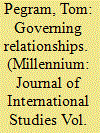

|
|
|
|
|
| Summary/Abstract |
The global human rights regime has undergone extraordinary expansion in the last thirty years. It is particularly notable for its profusion of state and non-state actors and levels of formal articulation. This article seeks to make legible the human rights governance architecture from the global to the local level, within an issue-specific domain. Orchestration theory is employed as a general mode of governance, with application across political units and political levels. Orchestration applies when a focal actor enlists and supports third-party actors to address the target indirectly in pursuit of shared governance objectives. Using the UN Optional Protocol to the Convention Against Torture (OPCAT) as an example, the article explores the authority relationship across two central political units (the orchestrator and intermediary), with a focus on how this new global human rights architecture may offer a way of bridging the steps separating international instruments from practices on the ground.
|
|
|
|
|
|
|
|
|
|
|
|
|
|
|
|
| 9 |
ID:
141198


|
|
|
|
|
| Summary/Abstract |
Videogames matter and they matter for international politics. With popular culture increasingly acknowledged as a valuable site for opening up new ways of interrogating theory, this article argues that important insights for the critical understanding of American exceptionalism can be developed through the study of military videogames. At one level, military videogames illustrate a number of prominent themes within American exceptionalism: they offer the perception that a threatening and hostile environment confronts the USA, thus situating America as an innocent victim, justified in using force in response; they allow exploration of the link between American exceptionalism and debates on the competence of political leadership, and they open up space to analyse the temporal dimension of international relations. Yet videogames also help expose the foundations (what Weber terms ‘the myths’) upon which American exceptionalism is based, here shown to be centred on the importance of the military industrial complex as a source of exceptionalism.
|
|
|
|
|
|
|
|
|
|
|
|
|
|
|
|
| 10 |
ID:
141205
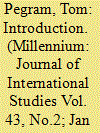

|
|
|
|
|
| Summary/Abstract |
Global governance is in flux. Scholarship on the practice of global governance has reimagined it as a realm of disputes and confrontation, rather than one of interest-alignment within multilateral interstate forums. A profound sense of governance deficit is provoking critical reflection both within the corridors of power and among practitioners and scholars. A call within academic circles for renewed reflection on global governance as a practice-oriented scholarship has elicited varied responses from the international relation (IR) fraternity. In taking stock of the state of the art of ‘global governance theory’, a number of scholars have advocated for its revival to be grounded in the kind of critical reflection often absent from mainstream IR discussion. Others contest any meaningful demarcation between IR and global governance scholarship. This forum responds to a number of converging developments. Situating contributions broadly within the notion of an interregnum, it is a first cut towards a more innovative global governance research and practice-oriented agenda. We focus, in particular, on reframing the problematique of global governance from one dominated by multilateral interstate geopolitics, towards a critical reappraisal of both structure and political economy in light of the evident complexity of global governance systems.
|
|
|
|
|
|
|
|
|
|
|
|
|
|
|
|
| 11 |
ID:
141194
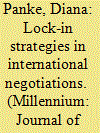

|
|
|
|
|
| Summary/Abstract |
There are hardly any instances of international negotiations, in which states do not at least partially recur to bargaining strategies. This article argues that bargaining power is ultimately a social construction, depending on perceptions about the plausibility of the realisation of a threat. Effective bargaining rests on the credibility of the threats made (e.g. no-vote, veto). Thus, even weak states can sometimes manipulate the threat-potential of seemingly more powerful actors and, thereby, punch above their weight in international negotiations. To trigger a loss of bargaining power, these states need to apply lock-in strategies that create linkages between the issue on the international negotiation agenda and other international or sub-level norms or policy commitments. Once such linkages are made, international-level bargaining threats of formerly powerful actors lose credibility as carrying them out would bring about severe reputation damages. This article distinguishes between different lock-in strategies and draws on three case studies (UNGA resolutions on African descend, on Myanmar, and on the Latin American Nuclear-Weapons-Free-Zone) to provide an empirical plausibility probe on the scope conditions under which the lock-in strategies are effective in reducing the power of seemingly strong actors in international negotiations.
|
|
|
|
|
|
|
|
|
|
|
|
|
|
|
|
| 12 |
ID:
141206


|
|
|
|
|
| Summary/Abstract |
Ever since global governance was introduced to the discipline of International Relations (IR), it has been criticised for its conceptual vagueness and ambiguity. In fact, how to even speak and think global governance – whether as a mere description of world politics, as a theoretical perspective to explain it, or as a normative notion to be realised through global policy – remains unclear. The article argues that this confusion exists not because of a lack of debate but rather because of the multiple understandings of global governance that are continuously advanced and implicitly reproduced within these debates. These different, partially overlapping and partially contradicting understandings constitute global governance as a ‘floating signifier’. It is argued that precisely because of this, global governance has obtained its ‘celebrity status’ within and beyond IR. Advancing a singular definition of global governance thus appears to be an arbitrary exercise as well as unnecessary disciplining. Rather than reducing global governance to a singular meaning, the debate in and of global governance would benefit from more self-reflected awareness as to when and how different concepts and understandings of it are invoked. To provide a framework for this, the article structures the different meanings of global governance by offering a taxonomy of different global governance applications.
|
|
|
|
|
|
|
|
|
|
|
|
|
|
|
|
| 13 |
ID:
141203


|
|
|
|
|
| Summary/Abstract |
This article argues for the need to think about the politics of regret more critically, within academia and beyond. The politics of regret here refers to the process through which the representation of past events comes to be dominated by apologetic voices in the public discourse. A brief overview of the most prominent previous attempts to make sense of the phenomenon shows why it is vital to strengthen the critical perspective on the issue. I assume that, in practice, the politics of regret almost always makes use of simplified representations of historical events that constitute images of the self and of wider society; as such, it should be properly understood as mythical. For this reason, I argue that the critical (scholarly and social) approach to the politics of regret should be based on a more general ethical framework with regard to myths that simultaneously acknowledges the right to existence of all interpretations of the past (including political regret) and challenges the exclusionary characteristics of mythologies.
|
|
|
|
|
|
|
|
|
|
|
|
|
|
|
|
| 14 |
ID:
141196


|
|
|
|
|
| Summary/Abstract |
This article seeks to place new/neo humanitarianism in a wider context of post-Cold War international relations and argues that its emergence corresponds to an important shift in the meaning of the political in contemporary international relations. It describes the shift in terms of the contrast between two logics of politics: the conventional logic of distinction, whereby political processes take place between territorially separated sovereign entities, and the emerging logic of translucency. The latter logic, in which new values (and risks) are generated by the actor’s ability and will to extend beyond its material and ideational boundaries, has been adopted by many global actors, including humanitarian ones. The article argues that new humanitarianism, which seeks linkage to activities that were once off limits to traditional humanitarianism, represents another example of the practical and ideational adaptation on the part of a traditional movement to a new political landscape.
|
|
|
|
|
|
|
|
|
|
|
|
|
|
|
|
| 15 |
ID:
141200
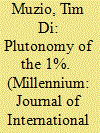

|
|
|
|
|
| Summary/Abstract |
This article offers a study on the plutonomy of dominant owners and what their consumptive practices might tell us from the lens of the capital as power framework in IPE. I argue that the differential consumption of dominant owners is an important dimension of an internationalised capitalist mode of power for two reasons. First, Nitzan and Bichler argue that the primary driver of accumulation is the desire for differential power symbolically expressed in a magnitude of money. In this article, I argue that there is a secondary dimension noted but underdeveloped in their framework and influenced by Veblen: the drive for social status and the display of positionality through differential intraclass consumption. Second, as identified by Kempf, I argue that the consumptive practices of dominant owners are helping to lock global society into an unsustainable and ethically indefensible quest for perpetual economic growth. This growth project not only undermines calls for needed social and economic change but also threatens populations with environmental collapse.
|
|
|
|
|
|
|
|
|
|
|
|
|
|
|
|
| 16 |
ID:
141208
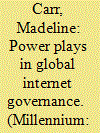

|
|
|
|
|
| Summary/Abstract |
The multi-stakeholder model of global Internet governance has emerged as the dominant approach to navigating the complex set of interests, agendas and implications of our increasing dependence on this technology. Protecting this model of global governance in this context has been referred to by the US and EU as ‘essential’ to the future of the Internet. Bringing together actors from the private sector, the public sector and also civil society, multi-stakeholder Internet governance is not only regarded by many as the best way to organise around this particular issue, it is also held up as a potential template for the management of other ‘post-state’ issues. However, as a consequence of its normative aspirations to representation and power sharing, the multi-stakeholder approach to global Internet governance has received little critical attention. This paper examines the issues of legitimacy and accountability with regard to the ‘rule-makers’ and ‘rule-takers’ in this model and finds that it can also function as a mechanism for the reinforcement of existing power dynamics.
|
|
|
|
|
|
|
|
|
|
|
|
|
|
|
|
| 17 |
ID:
141195


|
|
|
|
|
| Summary/Abstract |
Against a surprising level of agreement between Clausewitz, contemporary military doctrines and critical war studies on an ontology of war as fighting, we suggest that the study of contemporary warfare needs to focus more on war as processing. Through Jean Baudrillard we argue that at least some of what is referred to as ‘war’ is no longer characterised by encounters through fighting. We exemplify our argument by how the repetitive battle-rhythm of military targeting strives for perfect war. What remains is not war as an object in itself, but a reified ‘war’ that obscures the disappearance of that very object. The debate on war contributes to the reification of such a war, as an imperative telling us: ‘we have a concept, you must learn to think through it’.
|
|
|
|
|
|
|
|
|
|
|
|
|
|
|
|
| 18 |
ID:
141210


|
|
|
|
|
| Summary/Abstract |
Global environmental governance in the Anthropocene is fundamentally different from older conceptions of environmental policy-making and sustainable development. Environmental problem-solving is no longer concerned with isolated problems, but rather with reorganising the overall relation between humans and natural systems. Empirically, this is reflected in the ever greater attention to questions of institutional interactions (e.g. between the issue areas of economics and environment) and functional overlaps between parallel governance approaches. Normatively, environmental governance in the Anthropocene is concerned with questions of equity and fairness on a finite planet. This article scrutinises the theoretical interregnum in global environmental governance by first sketching the key empirical trends in global environmental governance; secondly, discussing theory-building with regards to four broad areas of inquiry: the questions of agency and authority; the structural dimension of global environmental governance; the related normative questions about legitimacy, accountability, equity and fairness in the Anthropocene; and finally the integration of governance research into formal approaches and the related incorporation of non-social science concepts into environmental governance research. In our conclusions, we propose some initial ideas on how to move forward in the study of global (environmental) governance.
|
|
|
|
|
|
|
|
|
|
|
|
|
|
|
|
| 19 |
ID:
141201
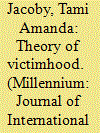

|
|
|
|
|
| Summary/Abstract |
What (and who) is a victim? In contemporary violent conflicts, the construction of grievance-based identity is a fundamentally contested process as the lines between victim and perpetrator are blurred by ongoing cycles of belligerence and retribution. As victims are incorporated into broader political campaigns, it becomes nearly impossible to separate the victim from the politics. The ubiquity of victims in international politics is a serious challenge to International Relations theory as categories of victim and perpetrator are generally treated as ‘prior or external to analysis’ instead of as propositions for further inquiry. This article formulates a political theory of victimhood driven by a distinction between victimisation as an act of harm perpetrated against a person or group, and victimhood as a form of collective identity based on that harm. It proposes a sequence of five stages that victims experience from the act of victimisation to the recognition of victim-based identity: (1) structural conduciveness, (2) political consciousness, (3) ideological concurrence, (4) political mobilisation and (5) political recognition. The article explores the stages with concrete examples and offers three main challenges for future research. First, as an identity, victimhood is more prominent in societies that recognise justice. Second, victimhood accompanies struggles for recognition. Third, victim rivalries obfuscate straightforward analysis of victimhood in conflict zones.
|
|
|
|
|
|
|
|
|
|
|
|
|
|
|
|
|
|
|
|
|